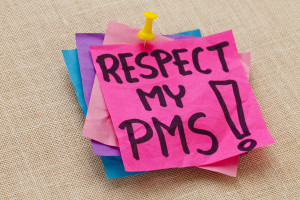Easing the Symptoms of PMS
That Time of the Month Doesn’t Have to Be Horrible
 It comes on every month like clockwork. The moodiness, the bloating, the cramps. It’s a miserable cycle that can disrupt work, your family life, and even your personal relationships. Premenstrual Syndrome (PMS), or the combination of symptoms that some women suffer about one week before their period, doesn’t have to disrupt your life. Today, our doctors are offering tips and advice for easing the symptoms of PMS, and reclaiming your life.
It comes on every month like clockwork. The moodiness, the bloating, the cramps. It’s a miserable cycle that can disrupt work, your family life, and even your personal relationships. Premenstrual Syndrome (PMS), or the combination of symptoms that some women suffer about one week before their period, doesn’t have to disrupt your life. Today, our doctors are offering tips and advice for easing the symptoms of PMS, and reclaiming your life.
What Causes PMS?
Changes in hormones associated with the menstrual cycle are the underlying cause of PMS symptoms.
Signs and Symptoms of PMS
Symptoms vary widely on a per woman basis, but may include: acne, tender breasts, fatigue, difficulty sleeping, upset stomach, bloating, headache, backache, food cravings, muscle or joint pain, mood swings, anxiety, or depression. What follows are a variety of options for easing these disruptive symptoms. If you have any questions about the techniques best for you, talk to your OBGYN.
Improve Your Diet
You should aim to eat well-balanced meals every day, but it’s even more important during the days preceding your period. Reduce the amount of carbs you eat (regardless of what you’re craving), and increase your protein, fruits, vegetables, and whole grains. Also, reduce your consumption of processed foods and sugar. In addition, salt can cause bloating, caffeine can increase anxiety, and alcohol may exacerbate feelings of depression. A healthy diet will help stabilize insulin levels to minimize hormonal shifts. Remember to also eat regular meals and snacks to reduce severe spikes in blood sugar levels.
Being overtired certainly won’t help your PMS symptoms. Make sure to get 7 to 9 hours of sleep per night. Lack of sleep could exacerbate your moodiness, or cause you to make poor diet decisions.
Exercise
Regular cardio will increase the endorphins that naturally tend to drop in the second half of your menstrual cycle, leading to mood swings and depression. Exercise also boosts your lymph system’s cleaning actions, ridding your body of toxins and excess hormones. It also increases your metabolic rate, which burns fat for energy, and helps establish a healthier hormonal balance.
Herbal Remedies
Herbal remedies are available that can help to regulate shifting hormones and minimize mood swings and cramps. Herbal options may include black cohosh, chasteberry, evening primrose oil, ginger, raspberry leaf, dandelion, or natural progesterone creams.
Take a Multivitamin
For some women, a multivitamin can help to restore balance to the body, especially when taken in conjunction with a healthy diet. An ideal multivitamin will include omega-3s, vitamins B, E and D, calcium, and magnesium.
Take NSAIDs for Pain
If back, muscle, and joint pen, or breast tenderness are severe, talk to your doctor about taking a nonsteroidal anti-inflammatory plain reliever (NSAID), such as ibuprofen or naproxen. Over-the-counter PMS medications such as Midol and Pamprin may be effective as well.
Consider Birth Control
If you’re not already utilizing an oral contraceptive, talk to your OBGYN about the benefits of taking a low-dose birth control pill to help regulate hormones and ease PMS symptoms.
Minimize Stress
This may seem like the hardest bit of advice; after all, how can one truly minimize the stress of work, family, social obligations, and community service? Still, making a conscious effort to reduce spikes of stress hormones can improve how you feel during those difficult days before your period arrives. Try deep breathing exercises, yoga, massage, meditation, and any other soothing activity that can help to re-center your body, mind, and soul.
Talk to Your OB-Gyn
That time of the month doesn’t have to be painful. Some women can experience severe PMS symptoms, but you don’t have to suffer in silence. Make an appointment to discuss your PMS with your OB-Gyn. He or she can suggest the best course of action to help you feel better.
Looking for a new Ob-Gyn? We are currently accepting new patients at all of our WNY locations. Call for an appointment today. We look forward to meeting you!
More
